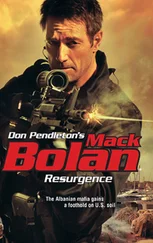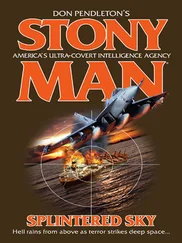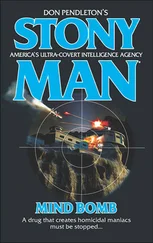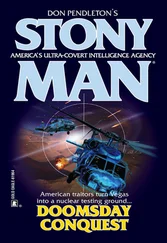Sitting alongside each other, Meyers and Gotterstein both ran a systems check, then started furiously typing for several minutes. Slowly, the room began to warm as the wall vents started sending out waves of heat.
Situated around them on the walls, a dozen plasma screens strobed into operation and began scrolling complex electrical schematics, data flow charts and endless lines of binary code.
“Dead?” Meyers asked without looking up from his work.
“Dead,” Gotterstein muttered, brushing back a curl from her face. “But essentially undamaged.”
“Excellent!”
“Agreed. The links are burned out. Those line fuses we installed last year apparently did the trick. The computer is off-line, but there has been no loss of memory, function or data. We can get this up and running in a couple of hours, and nobody will be the wiser that every bank in Switzerland temporarily lost all of their financial records.”
“I concur,” Meyers said, leaning back in his chair. Then he grinned widely. “Score one for the good guys, eh?”
“Praise Jesus!” She laughed.
Trying not to roll his eyes at the religious nonsense, Meyers said nothing. The woman was an expert at writing code and fixing hardware, a rare combination these days. Her only flaw was a ridiculous belief in supernatural mumbo-jumbo.
“I’ll call my wife and let her know I’ll be late for dinner,” Meyers said, rummaging in a pocket of his heavy coat.
“Late for dinner tomorrow,” Gotterstein countered, extracting her own cell phone. “I’ll call our contact at FINMA and give him a preliminary report.” She referred to the Swiss Financial Market Supervisory Authority, which oversaw Swiss banking.
“Be sure to tell him what a difficult job it is, but we’re more than capable of handling the repairs.”
Glancing sideways, Gotterstein stroked a finger behind her ear, then displayed it to the man to show that it was bone-dry.
Chuckling, Meyers hit speed dial. As the connection was made, the whole fortress shook as thunder boomed directly overhead, the noise echoing among the cannons and bunkers.
“Thunder snow.” Gotterstein laughed, both thumbs tapping on the miniature keyboard of her phone. “God, that takes me back to my youth. Haven’t heard it in years.”
“Me neither,” he said with a worried expression as the thunder sounded again. Louder, longer and much closer.
“Della, let’s get out here,” Meyers said, quickly standing. “If the primary computer across the street actually was burned out of existence by lightning, then perhaps—”
Just then, he was interrupted by a terrible crackling noise as a lightning bolt crashed onto the barrel of an antiaircraft cannon. The surge of power arced off the melting breech to reach down the tunnel and hit the control station. Still holding their cell phones, both Meyers and Gotterstein died instantly, without even knowing what had just happened.
Another bolt arrived, igniting the corpses, exploding the controls and flashing along the wiring. The power surge failed to reach the main CPU buried safely deep underground. But a third bolt hit, followed by a fourth, fifth, sixth… . The bombardment went on and on, arcing finally across the gap in the line fuses and burning out the main servers.
Instantly, every file was erased. But the attack continued, bolt after bolt, until the mainframe was on fire, the CPU a charred husk and all of the primary circuits melting.
Halogen gas hissed from the ceiling to try to extinguish the blaze, but the lightning flowed along the swirling fumes to spread along the fire-suppression system and reach into every room of the fortress. Almost immediately, a dozen of the bunkers full of high-explosive shells were reached, the combined reverberations echoing along the mountains and hills for a hundred miles.
Along the Amazon
MOTORING ALONG THE AMAZON River, Bolan landed at a trading post several miles downstream and caught a tramp steamer. A few hours later he reached Beln where a rental plane was waiting. Checking over the plane to make sure that it hadn’t been tampered with in any way, Bolan took off and landed in Brasilia, the capital of Brazil, by early afternoon.
Changing his clothes in the plane, Bolan then proceeded to the security station. Customs inspectors in Brazil were far less stringent than in America, especially since his diplomatic passport made Bolan legally untouchable, and his hunting permits were all in order. Over the years, he had found a dozen different ways to move military ordnance across borders. In third-world nations a simple bribe often did the trick. Brazil wasn’t in that class anymore, and was rapidly on the way to becoming the first of the new superpowers. He would have to be more discreet. However, posing as a diplomatic aide for a politically neutral country like Finland, always facilitated Bolan’s ease of entry, or a quick exit.
“I did not know that Finland had an embassy in our country,” the inspector said in halting English.
“As a courtesy, I will refrain from mentioning that to the ambassador,” Bolan said with a dignified sniff.
On the floor were several bags, an arsenal of ammunition and hunting rifles nestled inside soft gray foam.
“No, no! I only meant that I… Here is your passport, sir,” the inspector said quickly to cover the gaff.
Slowly accepting the passport, Bolan tucked it away inside his white linen suit, then stared at the minor airport official in disdain, turned and walked away. So far, so good.
However, Bolan noted that the security cameras in the ceiling tracked his every step through the concourse, so he stayed rigidly in character until renting a car and driving away.
To throw off any possible tail, Bolan drove to an expensive hotel and switched to a different car from another rental agency. Then he did it again, exchanging the luxury car for an inconspicuous van.
Now far less noticeable, Bolan traveled to a storage-locker facility outside town, and paid for three adjoining units. As he unlocked the doors, he noticed a group of men playing a game of soccer in the grassy field across the street. They seemed a little old not to be working at this time of day, so Bolan watched them for a while. Located in remote locations, storage units were a favorite target for street gangs. However, the men played hard, and when they broke for beer, Bolan continued unloading the van.
In the first and third units, he installed a proximity sensor rigged to call his cell phone if the units were activated by an intruder. In the middle unit, he stashed the steamer bags, arming himself with a shoulder holster and Beretta. He left the body armor behind, but did don a thick undershirt of ballistic cloth. The resilient material would stop most shrapnel and small-caliber bullets. The impact would still break his bones, but he wouldn’t die immediately. That wasn’t much, but where he was going next it was all that he could risk wearing.
Driving back toward town, Bolan got a text message from Brognola about the lightning strikes in Bern. Temporarily, the ten largest banks in the world had no way to record a money transfer. The soldier knew that could have only a single purpose. The terrorists were preparing to sell the weapon. He scowled at that. First, they killed every expert in the field, then they made it impossible for the banks to reveal any details about a purchase.
Bolan noted sourly, maneuvering through heavy traffic, that these were Swiss banks, financial institutions world famous for never telling anybody anything at all.
Reaching the outskirts of the city, Bolan was immediately snared in rush-hour traffic. Exercising extreme patience, he spent the next two hours crawling along, dodging taxicabs, pedestrians, trucks and work crews, while listening to the radio for any news about recent attacks until he finally reached the Grand Imperial Casino and Resort.
Читать дальше












